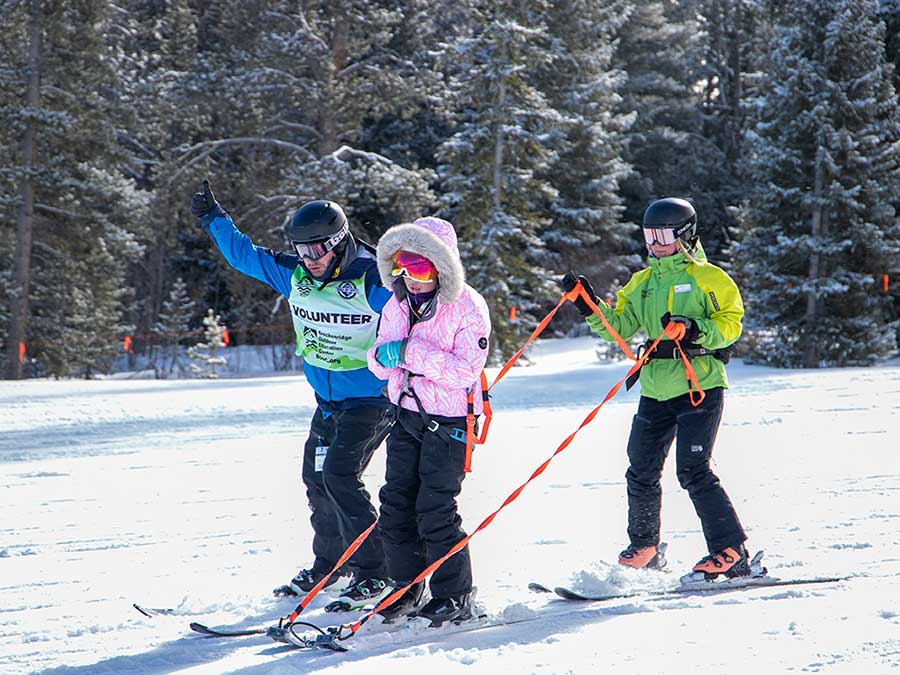
Ed Bronsdon gives a thumbs up as Ellie is tethered by Emma Brophy.
What began as a romantic love story about two people who happened to be at the right place at the right time, turned into a tale of two parents who would eventually find themselves doing anything and everything for their daughter with Rett Syndrome, including moving 1,250 miles from their home in Washington State to Colorado. It’s been a narrative that has encompassed the past 20 years, a couple of decades of ups and downs that eventually led this family of four to Breckenridge, Colorado and, in particular, the Breckenridge Outdoor Education Center (BOEC). This is the story of Rob, Heidi, Ellie, Rhys, and their inexplicable journey to the slopes.
In 2002, Rob and a friend embarked on a surf trip that was to take them to some of the hottest breaks in the world before ultimately settling and beginning their new lives in Australia. However, plans changed for the two UK natives when they met a group of Seattle-based Americans while chasing waves in Costa Rica. A friendship was formed, and when Rob went to visit them in the Emerald City, his life changed forever when he met his future wife, Heidi. The chance encounter led to the two declaring their nuptials through the sunroof of a limousine in Las Vegas just five months later. Some might say it was destiny as the two settled down in the small city of Bainbridge Island, complete with majestic views of the Cascade Mountains.
Seven years elapsed, Heidi was busy working as a graphic designer for multiple advertising agencies in the Seattle area, and Rob was excelling in his role as a project manager for Microsoft. But something seemed to be missing from their lives. The couple decided to try their hand at adoption, and not too long after, came baby Ellie, born three months premature. The new family of three was now complete, and all was good in the household until, two years later, Rob and Heidi noticed something amiss with their baby girl. Skills she had been exhibiting earlier in life started to disappear, and she began missing out on the typical 2-year-old milestones. Something was going on, and the doctors pointed Rob and Heidi towards the autism spectrum.
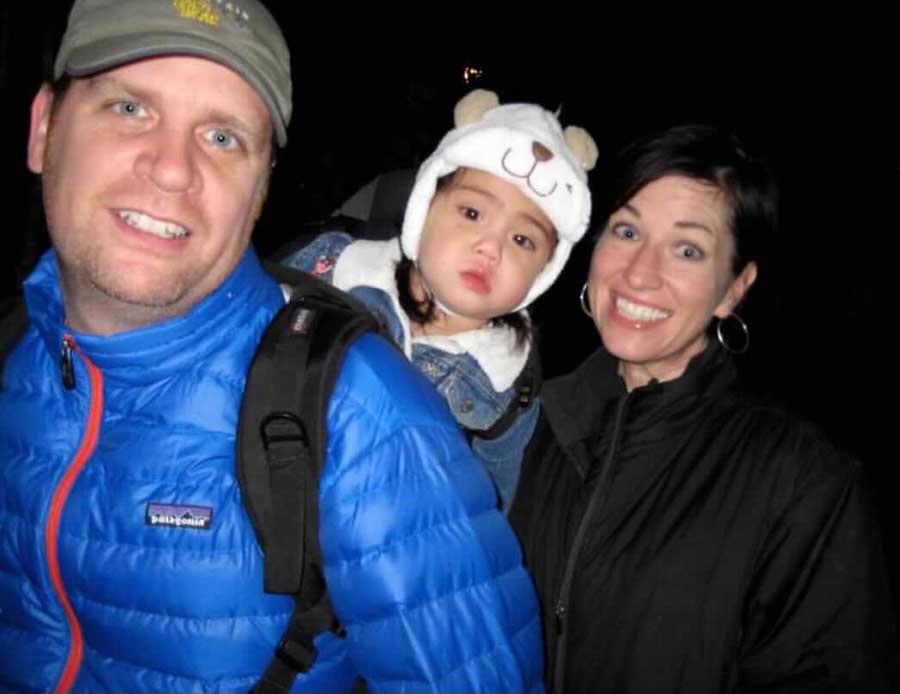
Rob, baby Ellie and Heidi.
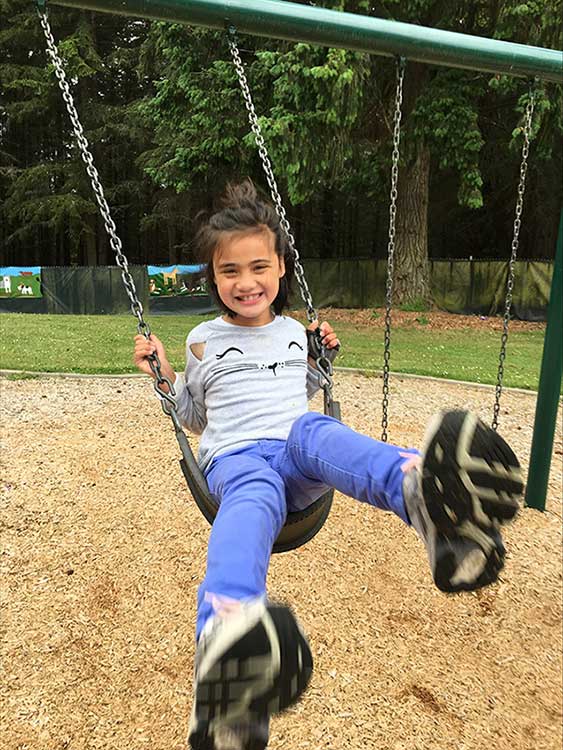
Ellie is all smiles on the swing set.
“There was nothing wrong with Ellie except she was a preemie,” remembers Heidi. “Then we started to ask ourselves why isn’t she doing this or that anymore, or she used to carry that and now she doesn’t. We knew something wasn’t quite right.”
With no official diagnosis in sight, the family proceeded with the typical therapies that would be given to any child on the spectrum. Occupational therapy, physical therapy, speech therapy, equine therapy, yoga, and swimming were all on the agenda, but Heidi wasn’t convinced with the diagnosis and spent years pushing for a genetic test. Ellie’s pediatrician finally got insurance approval for the test when Ellie was seven years old and it confirmed what mom had thought all along… Rett syndrome, a rare genetic neurological disorder that affects 1 in 10,000 females (and even more rarely in boys), leading to severe impairments affecting nearly every aspect of the child’s life: the ability to speak, walk, and eat. Ellie was born with the condition that typically doesn’t show symptoms until around two years old. Now it all made sense.
“Most (Rett syndrome) look like your typical little girl before they start to lose their skills,” says Heidi. “A lot of girls talk, walk, have hand use, and all these things, and then it’s all taken away.”
However, Ellie’s situation was anything but typical. The majority of Rett girls are diagnosed by the age of two, only about 30 percent can walk, a high percentage have seizures, almost all are non-verbal, most have little to no hand use along with breathing issues and anxiety, and the majority are very small in stature. Ellie didn’t exhibit a high range of any of these symptoms, and at the time, she was just a normal size seven-year-old, leading to her delay in diagnosis. To baffle doctors even a bit more, now at 13 years old, Ellie has grown into an atypical size for those with Rett syndrome and even has size nine feet.
“She’s not typical in that regard,” says Rob. “When we looked online at the time, Ellie didn’t seem to match up with the classic symptoms of most girls living with Rett. She could walk, use her hands, didn’t have seizures and was in line physically with her age.”
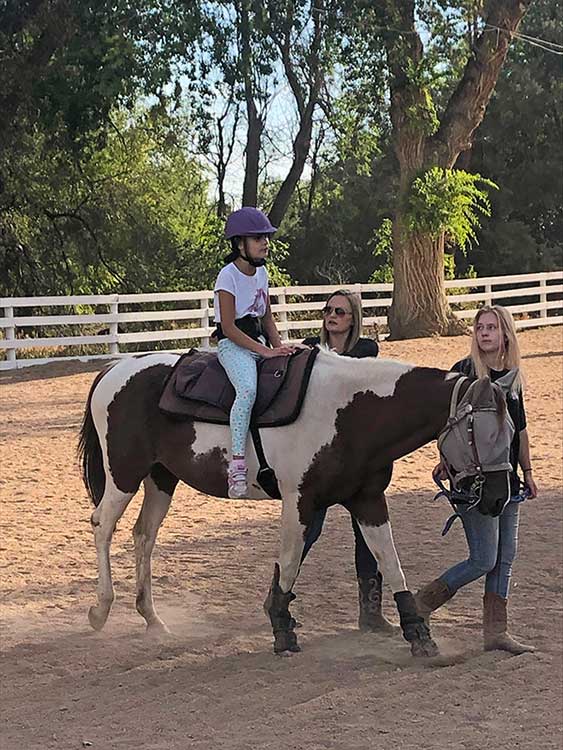
Part of Ellie's treatment for Rett syndrome is equine therapy.
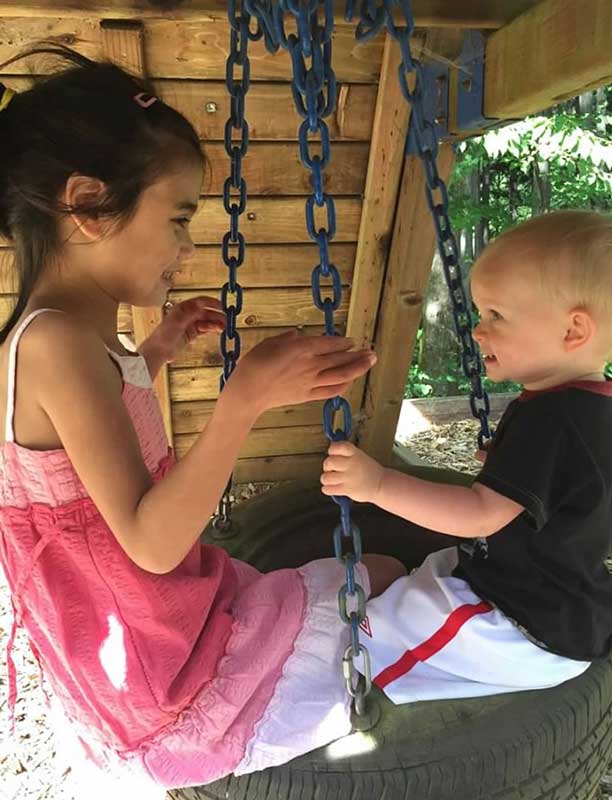
Ellie and Rhys enjoy each other's company on the tire swing.
So, now the family of three had experienced a little chink in the armor, so to speak, but nothing the two couldn’t handle. Heidi was simply thankful that Ellie was safe and sound in her loving arms, but Rob had a harder time initially taking it all in.
“It takes a long time to get used to the fact that you have a special needs kid,” he says. “It’s almost like a grieving process. You have this idea of where your life is going to go, and in an instant, it’s all taken away. Life seems to do that a lot.”
Heidi echoes, “It’s hard to look back on pictures when you see things that she used to do. The before-Rett time. That’s hard.”
But life goes on, and after five months of treatment at a clinic in Seattle, and another seven months at home on the “Island,” the couple opted to seek a higher level of treatment, ending up at the Rett Clinic at Children’s Hospital Colorado: one of 15 Rett Clinics in the world to be awarded a Center for Excellence standing by the International Rett Syndrome Foundation. Now a family of four after the birth of their son, Rhys, in 2014, they uprooted all that they knew and moved to Fort Collins in Northern Colorado.
As Heidi explains, “There’s something like 15 Rett Clinics across the country, and Denver is one of the top. Dr. Benke, who is the clinic director, is also her neurologist. That’s why we moved to Colorado… for the top-notch care they offered Ellie.”
In the meantime, Heidi was forced to give up her 11-year marketing career with REI to become a full-time stay-at-home mother and certified nursing assistant (CNA) to Ellie. Something she approaches with a chuckle.
“I do get paid now, but I just get paid to be her mother instead,” she says with a smile. “I went from graphic designer to nursing assistant and I wouldn’t change it for anything.”
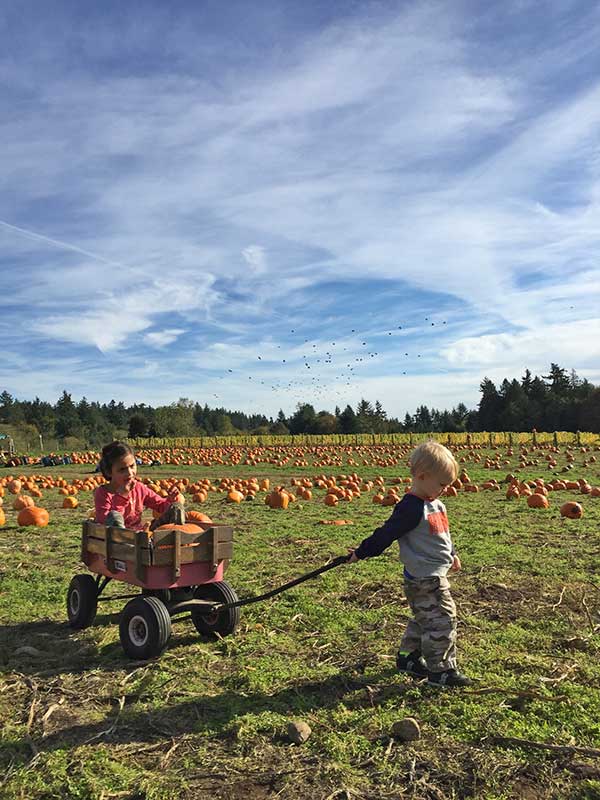
Sibling love at the pumpkin patch.

Ellie holds back a smile.
Ellie is now thriving as much as anyone could’ve hoped for. Dr. Benke predicts that her current condition is as good as it will get without any future medications, but in the meantime, the family approaches each day as it comes. According to her parents, she has on and off days where one day things just click and other days where everything is much harder. But they continue to communicate with Ellie the only way they know how.
“We call it eye talking,” says Rob. “It’s almost like she looks at you and sends a bunch of information to your brain. We’re, in a way, telepathic with her.”
“She’s talking, she just can’t get it to come out,” says Heidi. “Oh trust me, there are times when she’s talking. She definitely lets you know when she is mad and she communicates with her eyes a lot – and all Rett girls do that – they’ll look at you for yes and away for no. So we get a lot of answers just by looking at her.”
So when one of Colorado’s favorite pastimes came up, one can only imagine what kind of eye contact was elicited by the idea of skiing. A trip to the BOEC was in order, and it just so happened that a family friend of over 40 years, Ed Bronsdon, is the Executive Director of a similar organization in the Pacific Northwest called Outdoors for All. Ed was miraculously on a ski vacation in Colorado at the time and offered his 37 years of teaching experience to Ellie and the family.
But before any skis could hit the slopes, because of the way Rett syndrome affects her muscles and the use of her body, getting ski boots on her feet is extremely difficult. Ed contacted longtime Outdoors for All board member and Category Merchandising Manager of Hardgoods at Christy Sports, Tracy Gibbons, and she made it her mission to find boots that would meet Ellie’s needs. Gibbons collaborated with her colleagues and landed with Danny, the manager at Christy Sports Ski & Snowboard in Breckenridge, who was ultimately able to track down a pair of rear-entry ski boots, making it possible for Ellie to successfully get her feet in and out of them. It was a team effort from the very beginning to give her every chance to get out there and ski.
“We had tried a lesson with just standard boots, and trying to get Ellie’s feet into those was really, really hard,” says Bronsdon. “So a rear-entry boot was going to be critical. Getting that success for her meant that we could then move forward. As simple of a win as getting a foot into a ski boot meant that we could then maintain that rapport and move it out to the snow.”
“Danny went above and beyond for Ellie,” says Heidi. “He even went so far as to get her skis to match her jacket. He’s our hero too! He was practically in tears when we told him how great she did.”
Matt Gold, CEO of Christy Sports, an annual BOEC sponsor, says in a recent press release, “Ellie’s inspiring story demonstrates the power and beauty of mountain and nature sports and the higher purpose of what we do at Christy Sports.”
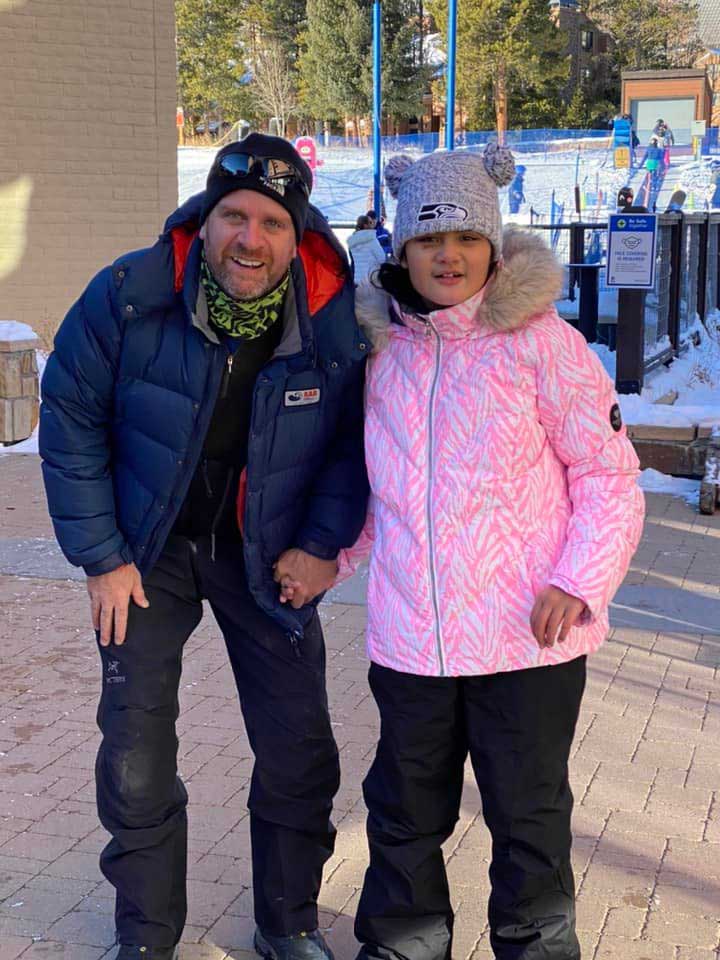
Father and daughter celebrate a successful ski day.
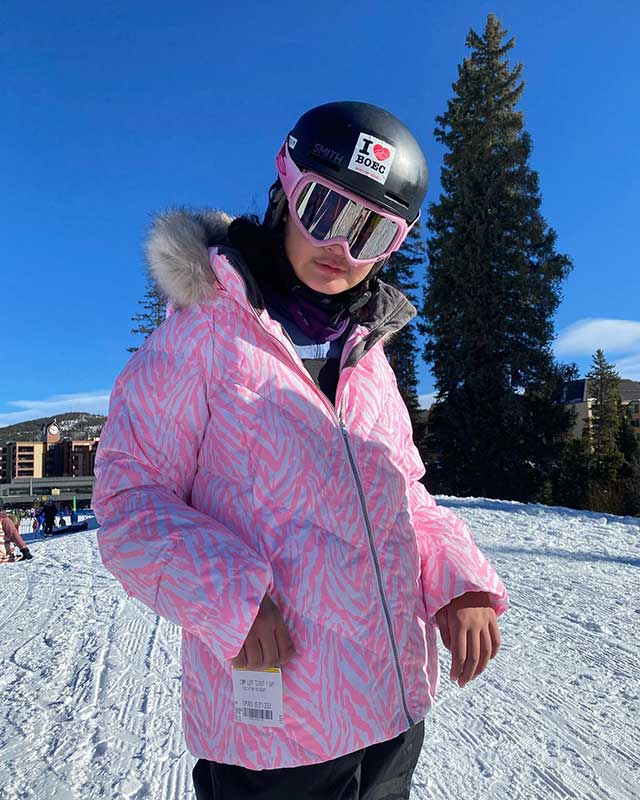
Ellie shows off her "I heart BOEC" pride!
With boots in hand (er feet), onto the snow it was for a few lessons at the BOEC, with Bronsdon leading the team of instructors composed of BOEC interns Emily Vican and Emma Brophy. The majority of the time was spent on the magic carpet, so Ellie could get the feeling of the skis under her feet. But the allure of the Quicksilver chairlift at Breckenridge Ski Resort flying overhead was just too much for the teenager to pass up. Mom’s emotions were all over the place.
“I was both frightened and proud. I knew she was going to be safe, and I knew she could do it, I was just scared for her,” remembers Heidi, executive board member of the Rocky Mountain Rett Association. “I didn’t know if she was going to be scared on the chairlift. Total mother stuff, right? Then she fell asleep on the chair and was actually more relaxed there than she was the whole time. I looked like Tammy Faye Bakker out there. My makeup was all over my face from crying.”
Nursing a hip replacement surgery four months ago, Heidi wasn’t able to physically join her daughter on the hill. So, while her husband tagged along to help with “Team Ellie,” she spent a lot of time with the BOEC staff, building unbreakable relationships in the process. In fact, it’s that trust factor that ultimately calmed those initial fears.
“We’ve only ever been to the BOEC and we will probably only ever come here to be quite honest,” says Heidi. “It’s the trust. They know her, and she’s familiar with everyone. It’s just been a wonderful experience and the people here are awesome.”
“On the mountain, Emily and Emma were never going to let her go,” Rob adds. “She was completely safe as they were constantly running through the protocols over and over again. It’s very much a systematic process, and you can tell that there’s a really high level of training to get to a point where they’re able to take somebody down the mountain like that.”
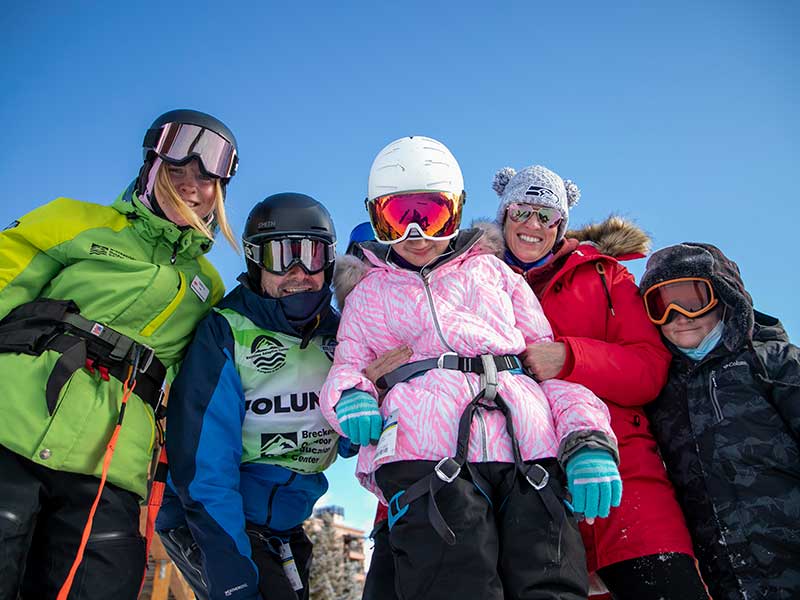
"Team Ellie" poses before heading out to ski.
And when asked what made this trust come to fruition, Heidi was quick to answer, “They treat us like we’re normal. As soon as we walk in the door, we feel like we are with our people, and they are all so excited to have Ellie there. Being the parent of someone with a disability can be tough. Our kids are looked at, people don’t always know what to say or how to act, and they have limitations put on them for no reason at all except that they have a disability. When we are up on the mountain, though, we have a group of people with the same attitude as us. And more than anything, Ellie is always treated with love and respect. People here talk to her as you would talk to any 13-year-old! There is no weirdness or awkwardness around her. To be surrounded by that and feel we have a team of people that GET HER and WANT to know her is the greatest feeling ever.”
“A lot of times, these kids are left on the sideline,” Rob continues. “They don’t get the classic social interaction, and here at the BOEC she does. She gets to be a typical kid, and she doesn’t always get to do that. It’s such a simple, taken for granted thing by most people.”
There was nothing typical about Ellie’s experience, however. In addition to having to secure a pair of rear-entry boots, she needed some pretty extensive support and tethering from Bronsdon and her BOEC instructors to successfully navigate the hill. Emma explains, “The biggest thing that Ellie contributes to her skiing is her ability to stand up. A lot of that is Ed and I trying to figure out how we can get her to stand independently. It ultimately comes down to a lot of things about how we support her.”
According to Bronsdon, all the obstacles faced and overcome were well worth it in the long run. “It’s just fantastic,” he says, with tears in his eyes. “Knowing how many challenges Ellie is dealing with all the time, for me to use my knowledge to give that family a chance to ski down the mountain is awesome. She was skiing down a mountain. Yea, we were helping her, but SHE was skiing down the mountain. SHE was the one that was doing it, and we got to be a part of it. That’s as close to Harry Potter magic as it gets in real life.”
And it wasn’t lost on Rob that he also got to experience something he never thought would be possible: skiing with his two children at the same time.
For me, it’s a really simple thing as a father,” he says. “I got to ride with my children. It’s something so normal and typically mundane for the thousands of people a day that come to ski and ride here, but for a family like ours, this is uniquely special and something I never thought we were going to get that opportunity to do.”
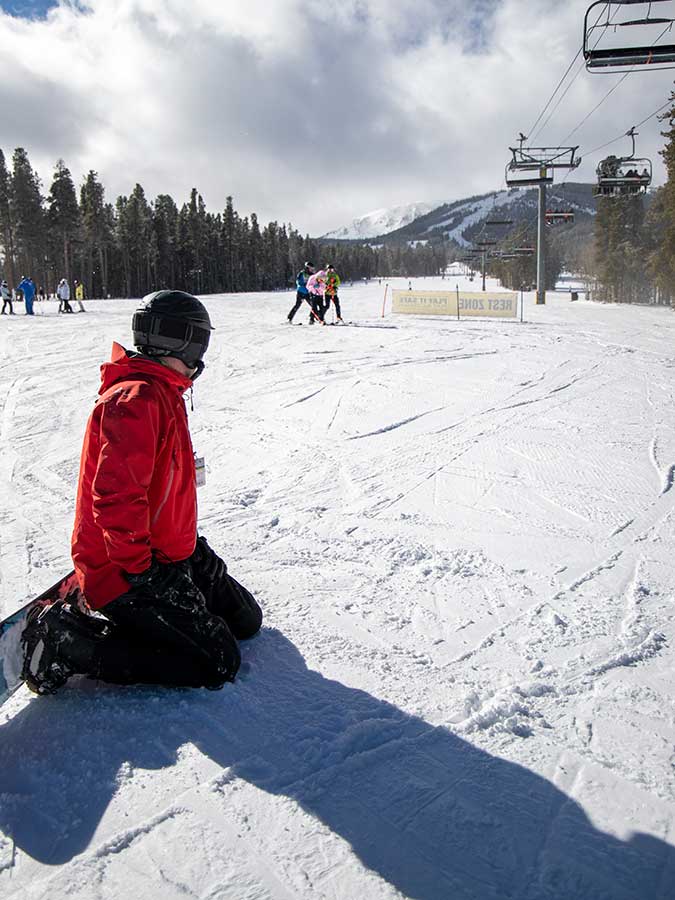
Dad watches in anticipation as Ellie approaches.
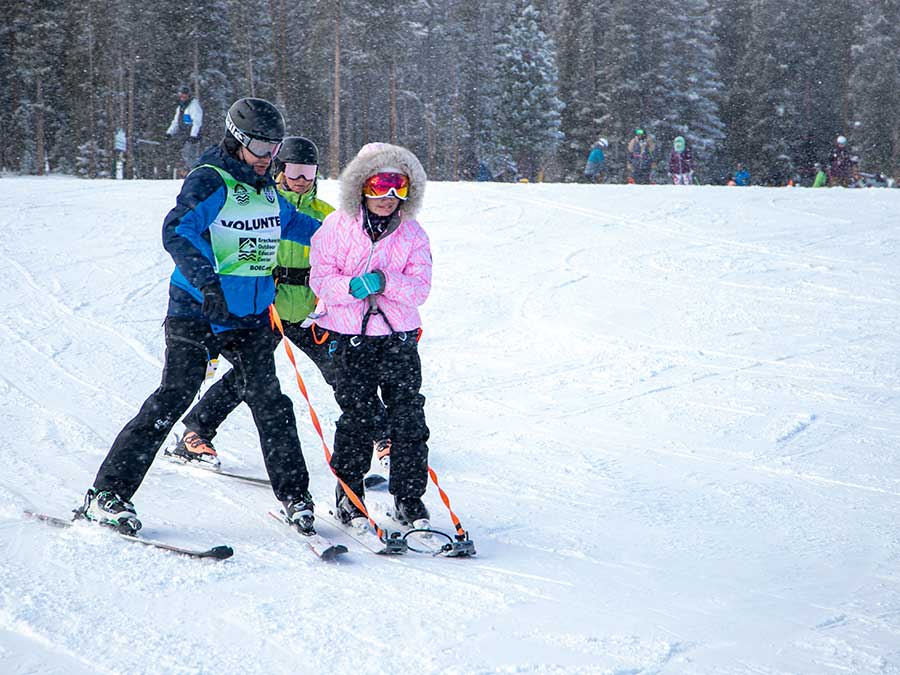
Ed, Ellie and Emma, the "three Es" of "Team Ellie."
Ellie seemingly enjoyed the experiences just as much as the rest of the team, according to her “eye talking.”
“We could see the pure joy in her eyes,” says Rob. “And when I say things like, ‘I’m so proud of you, you’re awesome,’ I get a pretty noticeable ‘I did a pretty good job’ kind of thing from her, where she can be proud of herself and experience a little bit of pride.”
“Ellie may not be able to speak, but her eyes and overall countenance spoke volumes to me,” adds Bronsdon. Her parents were ecstatic and in tears. I could tell that Ellie had a memorable time, and I know that I sure did. Ellie and her family can’t wait to come back to the BOEC.”
Well, just over a month later, the family of four did in fact return to the BOEC for more fun in the snow, but this time they were joined by the hustle and bustle of the Breckenridge spring break crowds. With extreme sensory overload a concern to all those involved, they initiated “Plan B,” and got Ellie into a bi-ski so she could enjoy the experience without having to navigate the congestion on the slopes. The snap decision to have Ellie sit down and ski was one that was not taken lightly, but illustrates the “adaptive” nature of these fluid situations and that there are many different ways to experience the exhilaration of skiing.
“I struggled with having her use the bi-ski because I felt like I was taking a skill away from her, and Rett syndrome has already done that enough,” says Heidi. “We talked for a long time about it and came to the conclusion that she needed to have fun and that being out in the snow flying down a mountain is what skiing is all about… regardless of what you use to do it. We know she can go on two skis, but we also know it’s a lot of work for Ellie, and in a crazy environment, it would have been too much. She’ll ski on two skis again, but now she also has this skill and absolutely loved it!
And how did Heidi know she loved it? “Her smile was huge,” she says. “She went over and over and got faster and faster. As hard as it was, we made the right decision for her and she let us know. When we were back talking about it afterwards with her team, she kept jumping up and down and saying “Fuuu” over and over… FUN! The fact that she had so much fun she actually told all of us, made our decision worth it. Yes, she said that. Yes, she said FUN!”
Future ski experiences for Ellie are definitely on the agenda, and Rob can already see the difference that the time on the slopes has already made for his baby girl.
“We’ll talk a week after or a month down the line about skiing and the smile comes back,” he says. “The memory comes back in her brain, and you can tell she’s proud of her accomplishments. She is one of the toughest human beings I know. For her to get out of bed, to just get through her life in general, is a million times more than what you and I have to deal with. Things like this (skiing) … she shouldn’t be able to do what we saw today. She shouldn’t, but she does. And she’ll keep doing it and keep pushing. I think she’s better for the experience.”
“During this entire process, I kept thinking to myself, never say never,” adds Heidi. “You can’t put any limitations on her. I was so scared, but parents seem to be the ones holding them back, so I figured we’ll never know until we try. That’s Ellie with everything she does. There are no limits! Always try, because if you don’t, you will never know what you are capable of.”

The happy family celebrates another BOEC success story.
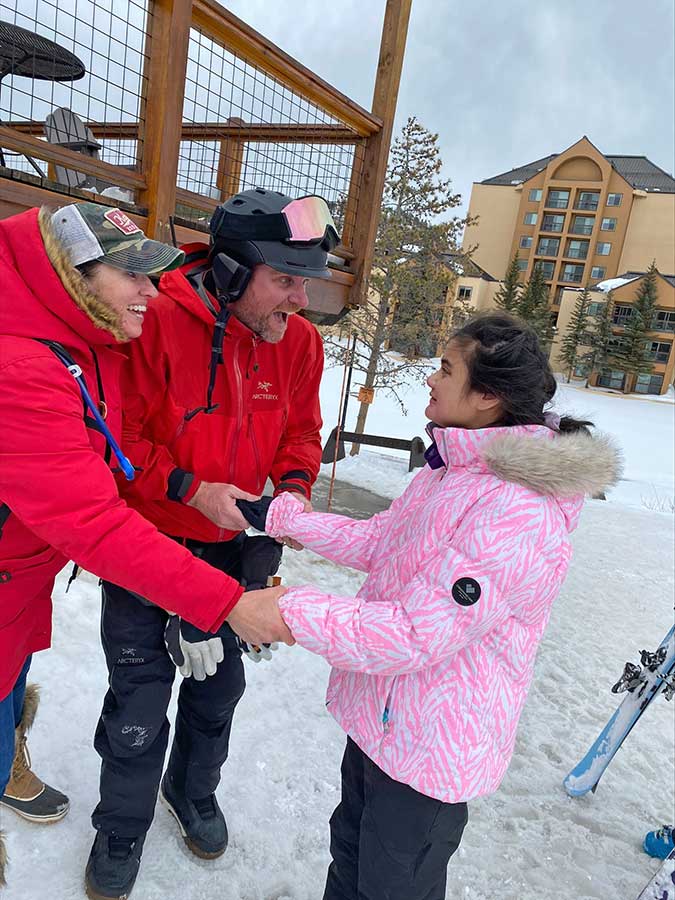
The family was all smiles as they rejoiced with Ellie!
“Team Ellie” in fact proved that just about anything is possible – a consistent message that we, here at the BOEC, experience on a daily basis in both our winter and summer programs. And it’s a theme that is not lost on the families of these individuals with disabilities and special needs either. Rob offers his advice to others in a similar situation.
“Don’t wait, just go,” he says. “Start with small steps and build up to bigger things. It’s a slow process, and you’re going to have setbacks, but eventually you’ll progress. The first time Ellie went (adaptive skiing), it took us an hour to get her boots on, and at one point, we couldn’t get her on two skis. Now she’s done multiple days of riding a chairlift and skiing down the mountain on her own legs. They can do it; you just have to keep going. They can do way more than I think we give them credit for.”
“So, thank you, Team Ellie! Thank you to all of you that LOVE to work with families like ours, that you have made this your life,” says Heidi. “You have NO IDEA how much of a difference you make in the lives of those you help. You do. You are our heroes for sure. THANK YOU! THANK YOU! THANK YOU!
Did you know that BOEC is able to keep its lesson fees low for participants like Ellie so we can remain as inclusive as possible? We rely on generous donors to make up the difference. To make a tax-deductible gift, please visit BOEC.org/give today.

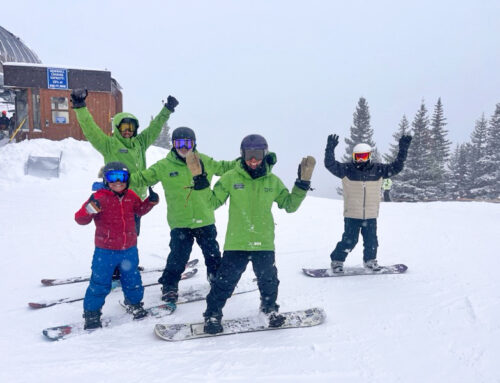
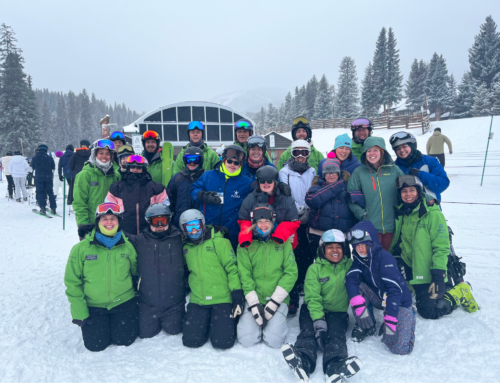
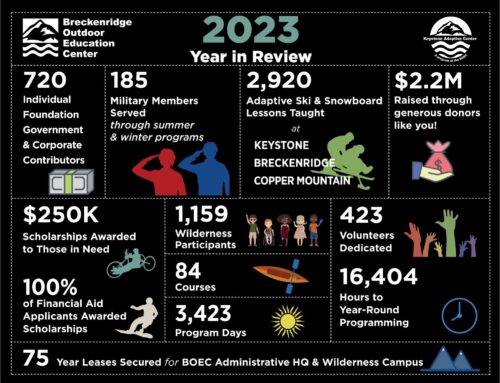

Such a great story! Way to go Ellie!!! Thank you BOEC and Outdoors for All for keeping the fun going!!